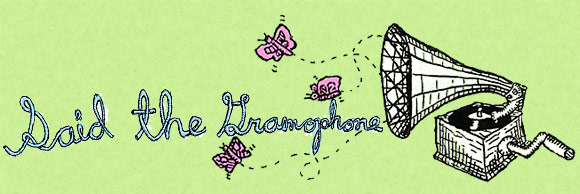Kathleen Yearwood - "Night Falls"
What are Canada's musical specialties? Idiosyncratic poetic variations on folk-rock music. Large collectives of equals enjoying one another's creative input. Inventive knob-twisting, tape-splicing and other winterlong basement pastimes. Weekend hoser head-banging. Lilith Fair-style singer-songwriters. And, less often remarked, women who've refused to take up any of the narrow positions offered by the entertainment industry and go another, utterly individual way, women such as Veda Hille, Jane Siberry, Jean Smith of Mecca Normal, Joni Mitchell in her day, the McGarrigle sisters (and Kate's daughter Martha) - hell, even Jann Arden from a certain angle. And then there's Kathleen Yearwood, the most enigmatic of them all, the one you haven't heard about.
Black metal bands wish they could sound so fundamental, manifest their menace so dizzyingly, imbue their wrath with all the world's undercurrent of danger the way this semi-folk-singing, maverick intellectual musician from Alberta does. She performs draped in red light, small fingers wrestling with the strings of a black electric guitar, sometimes flinging beer bottles to shatter in an amplified metal bucket. She sings in English and in French and in tongues. She has a band called Ordeal, which can be one, and sometimes features masked naked male dancers. She sings about sex, love, hate, mutilation, mammals and class war in tones sometimes gently folkloric, sometimes shrilly Wagnerian, sometimes delta-blue by way of Diamanda Galas. When she gets press she's often described as living in a shack in the woods, and whether she still does or not, it's easy to fantasize that this is music made under a tarpaper roof with many dogs and cast-iron pans around. On her MySpace page she quotes praise from Eugene Chadbourne and David Thomas of Pere Ubu, and she lists her influences as 'S. Indian Classical Music, Fado, grinding gears and shrieking metal of aircraft and trains, trainyards, the limits of human vocalization, coyotes, birdsong, a rabbit shrieking in death throes, metal, 80 year old women singing solo, silence.'
So forgive us if we're not always so impressed by all the talk about 'freak folk' and totem-animal-touting groups from Brooklyn. The old weird Canada remains stubbornly vital no matter how hard urban sprawl pushes to pave over it.
This track is on the CD that accompanies the current issue of Musicworks, another eccentric Canadian holdover - originally edited by John Oswald, of Plunderphonics fame - that has persisted in the face of probability and good sense. The current issue features Negativland, an Italian improv group called 3/4hadbeeneliminated, and Minegishi Issui, a Japanese woman who plays a one-stringed board called the ichigenkin, 'so rare that most Japanese have never heard of it.' (Full disclosure: It also includes a review by me of a Swiss sound-poetry album based in Saussurean linguistics.)
I had a terrific conversation with my friend Misha's visiting cousin Adam tonight, about Robert Ashley and Gertrude Stein and Morton Feldman and Mauricio Kagel. It was too brief, but I was reminded how great it is sometimes not to talk just about rock and pop music. Then I came home and saw Musicworks on my desk, and felt grateful.
[Buy Kathleen Yearwood's music] [Subscribe to Musicworks]
I have often wondered, but never properly investigated, whether the Canadian penchant for oracular lyric-writing and unconventional vocalisation reflects a sidelong influence from First Nations cultures. It certainly seems intuitive to pair Kathleen Yearwood's capacious vocal style with that of Inuk throat-singing innovator Tanya Tagaq Gillis. Having invented an entirely new, expressionist, erotic genre of her own, transgressively adapting the northern throat-singing tradition, Tagaq gained conspicuous supporters such as Bjork (she contributed substantially to the Medulla album) and the Kronos Quartet. And yet there hasn't been sufficient hubbub about her here at home. Toronto poet Angela Rawlings pointed out to me that Tagaq's album Sinaa is glaringly omitted from the shortlist for the Polaris prize, and I could only wince in shame that I hadn't thought to nominate it myself. In essence I hadn't played it enough, as it is no casual listen. It makes excursions into textural territories of voice that neither pop singing nor high-kulcha experimental performance really have explored. But it's also an inexplicably emotional record, no mere formal or cultural exercise. You feel Tagaq is telling a poetry of breath and body with a lyric core, a subjective account from inside the skin of a 21st-century woman with a history in Nunavut but also a life in the cosmopolitan contemporary world. She can sound like a hungry black bear but she can also sound like a beat-boxing laser printer; the music incorporates generations-old techniques but at times, as in the closing measures of Origin, I can imagine it's a stray channel from a house-music dance track.
The new weird Canada is as epic as the old.
Posted by Carl Wilson at July 11, 2006 3:51 AMCarl, you failed to mention Mary Margaret O'Hara among the other eclectic female singer-songwriters...
It's ok, though. She's used to it.
Posted by Jeremiah at July 13, 2006 10:14 PMSpeaking of Mary Margaret O'Hara, did anyone get to see her in The Black Rider? Amazing.
Posted by Andrea at July 17, 2006 9:56 PMWow. That Yearwood song made me run right out and buy the CD. Thanks!
Posted by 2fs at July 27, 2006 4:11 PMAnyone here catch Mary Margaret's stunning backup vocal on the last Justin Rutledge CD, No Never Alone? Took 36 takes, it did - and the only negative review the CD got was from Uncut in the UK, which complained that she was only on one track. If only they knew how difficult that was, though it was utterly wonderful and worth all the trouble!
Er, I have to confess I co-manage Justin, so you may not care to take my word on this!
Posted by Richard Flohil at August 21, 2006 10:55 AM



